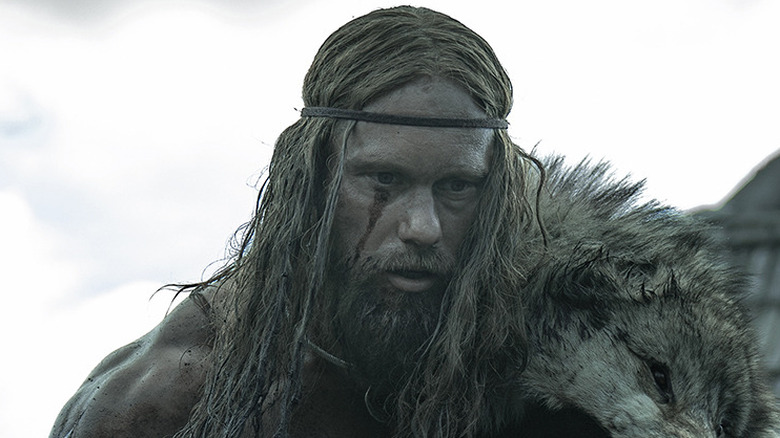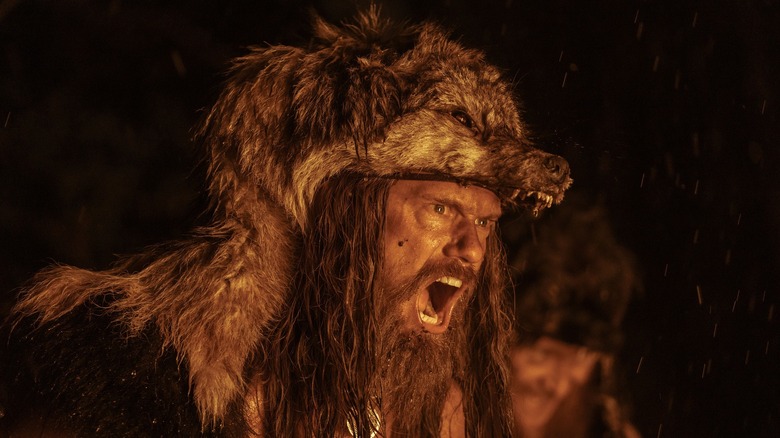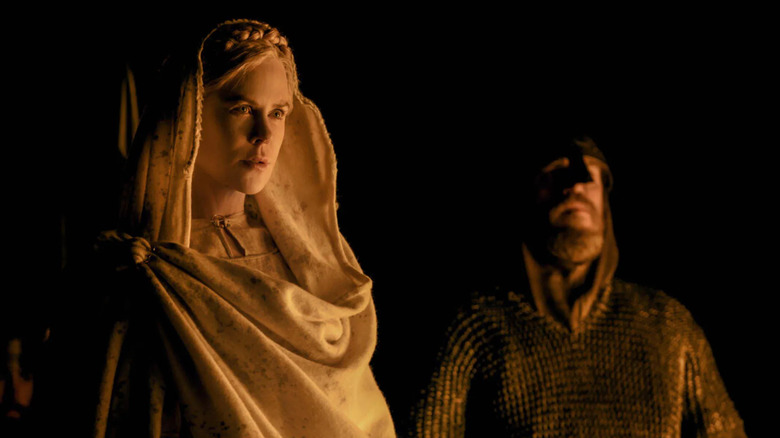The Northman Review: Going South
Robert Eggers knows he'll never get to make another movie like "The Northman" again. In a recent, unexpectedly candid, New Yorker profile of the filmmaker, he spoke in depth about the behind the scenes struggles of making his Viking revenge epic, airing the kind of stories about the production's troubles that aren't typically voiced until many years later. It was notable for several reasons, not least because it seemed to be preparing the sizeable cult fanbase of his two prior films (2015's "The Witch" and 2019's "The Lighthouse") for a compromised studio product. At one point, he even remarked that the finished cut, re-edited after muted early test screenings, "was the most entertaining version of the film" — something he seemed to have mixed feelings about delivering.
Naturally, this studio-approved cut of "The Northman" is Eggers' weakest directorial effort to date, a retelling of the Scandinavian legend which inspired Shakespeare to write "Hamlet" that triumphs in terms of pure cinematic spectacle, but feels ever so slightly insubstantial when viewed as anything more than a genre exercise. Eggers has previously said he explores our present by looking through the past; the paranoia of his folk horror debut reflected contemporary societal fears about women in power, while his darkly comic second feature used its queer undertones to explore male power dynamics. None of this richness in theme is present in his latest. It's brought to life once again with an unparalleled attention to historical detail, but as the central revenge plot proves too familiar even in the hands of this most distinctive of directors, I found myself only able to appreciate it in terms of its filmmaking craft.
Style over substance...
In a prologue, we're introduced to young Prince Amleth. The year is 895, and his father King Aurvandill (Ethan Hawke) has returned from battle, readying his son for a ceremony in which he will become a man — something that consists of howling like a wolf, burping, and farting. This flatulence is the clearest sign that, yes, you are watching the latest film from the director who got an entire film's worth of comic mileage out of Willem Dafoe breaking wind. Unfortunately, the levity ends here. Soon after Amleth experiences his rite of passage, his father is slain in front of him by his uncle Fjölnir (Claes Bang), with the kid fleeing the scene and setting sail to safer territory, vowing only to return one day to avenge his father and save his mother (Nicole Kidman) from the man who killed her husband.
We pick up several years later. Amleth has now grown into Alexander Skarsgård, and travels across Eastern Europe pillaging settlements. Eggers' desire for historical accuracy ensures this isn't a sanitized depiction of Vikings; he hasn't made anything that could be appropriated as heroic by white supremacists like some commentators have feared (Norse mythology remains beloved by the European far right), but he also doesn't delve into the complications of its character in the way you might hope either. The parallels between how he fled home and how he's now displacing others are visibly there, but don't impact the central character study in the way they should — a richer, more complicated revenge saga frustratingly within grasp, but ignored to follow the basic mechanics of a revenge narrative.
His lifelong quest gets back on track after a seeress (Björk, whose performance sadly amounts to a cameo) appears to tell him he finally has his chance to take on Fjölnir. He hides on a slave ship heading to Iceland, and finds himself in the village where his uncle, to whom he is now unrecognizable, resides — with his mother now happily married to him. With the help of fellow slave and sorceress Olga (Anya Taylor-Joy) he aims to take down Fjölnir's men before killing his uncle and saving his mother from what seems like marital imprisonment. What could possibly go wrong?
... but the style is incredible
It's unfortunate that "The Northman" succeeds only when it comes to realizing its nihilistic style, but make no mistake, Eggers' recreation of this grim period of history is utterly commendable. Working with his regular cinematographer Jarin Blaschke, each sequence is crafted like no other film on this scale; patient, single camera shots that slowly introduce us to each new setting or period in the story. The aforementioned New Yorker feature highlighted the all-star cast's bafflement on set to Eggers' favored way of shooting these bold sequences — why would he film a violent siege sequence from just one perspective (to name the most visually arresting example), rather than shoot for coverage if needed? But the boldness pays off, allowing you more time to soak up every minor detail of the elaborate production and costume design onscreen, submerging you in the era to the extent you can practically smell the mud and burning houses.
Nothing else in the film makes as visceral an impact, a disappointment coming from a filmmaker whose prior two films got uncomfortably under the audience's skin in different ways. This might be the fault of adapting a story whose bare bones inspired everything from Shakespeare to "The Lion King," with very few moments generating the prickly discomfort that characterized his prior features due to narrative familiarity (it almost made me relieved his "Nosferatu" adaptation has been canceled). A notable exception to this is Nicole Kidman's performance; although in many ways the driving force for Amleth's vengeance, she largely remains a background presence until the second half, when one monologue slowly blossoms into the most disturbing sequence the actor has starred in onscreen since the bathtub scene in 2004's "Birth."
It's the only genuinely unexpected moment in a straightforward tale of revenge, designed to split audiences down the middle between fits of uncomfortable laughter and genuine queasiness. It's also the moment Eggers finally begins to explore the complications that come with chasing vengeance on your own personal terms, a rich theme that almost immediately falls to the wayside as we arrive at the expected third act bloodbath.
Eggers' films have long had style, but "The Northman" is the first time he's ever prioritized it over substance. The film features some of the grandest cinematic spectacle you're likely to see at the movies this year, but despite coming from a singular directorial voice, the story around it doesn't reinvent the revenge epic so much as it laboriously conforms to its conventions.


